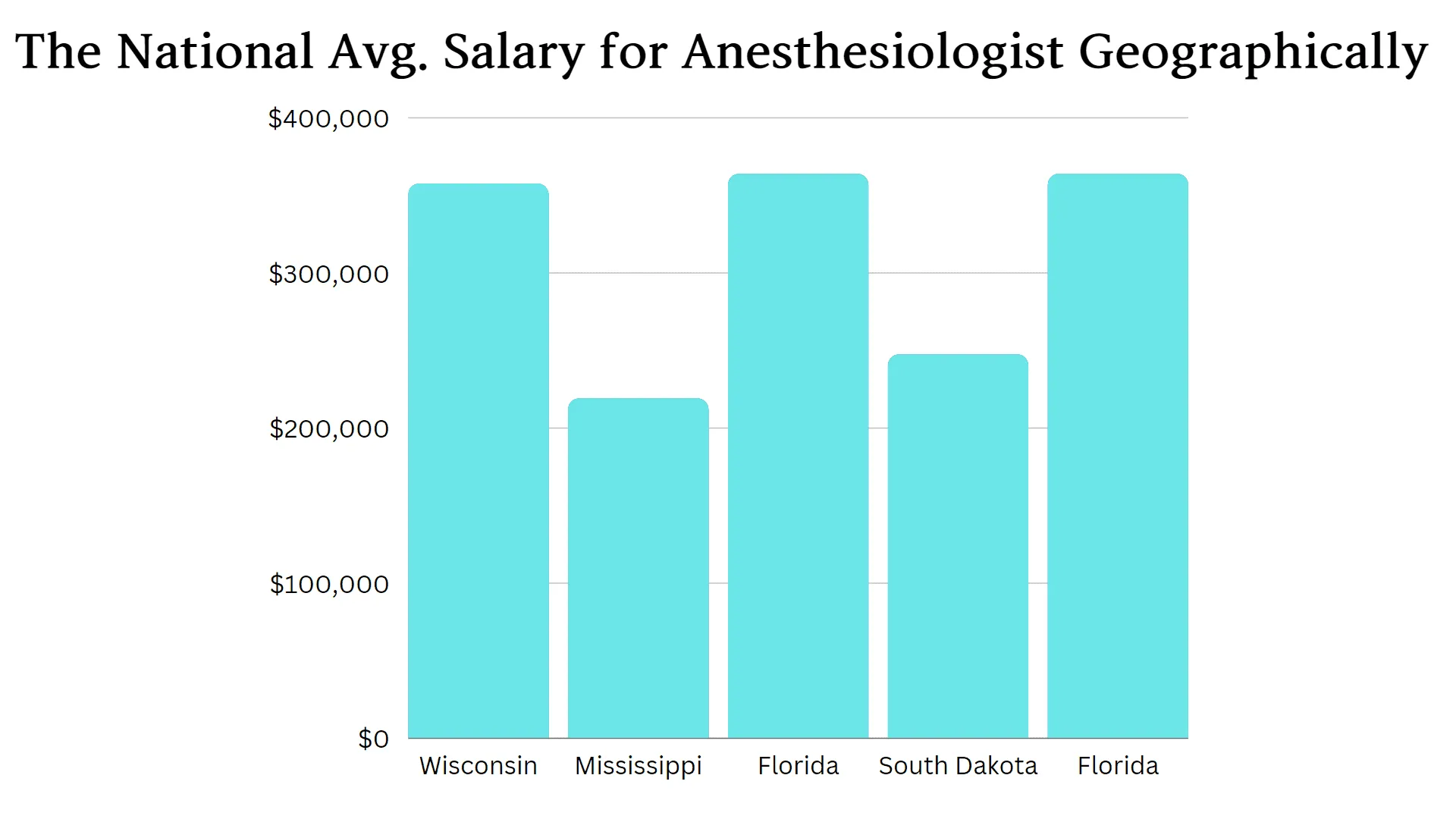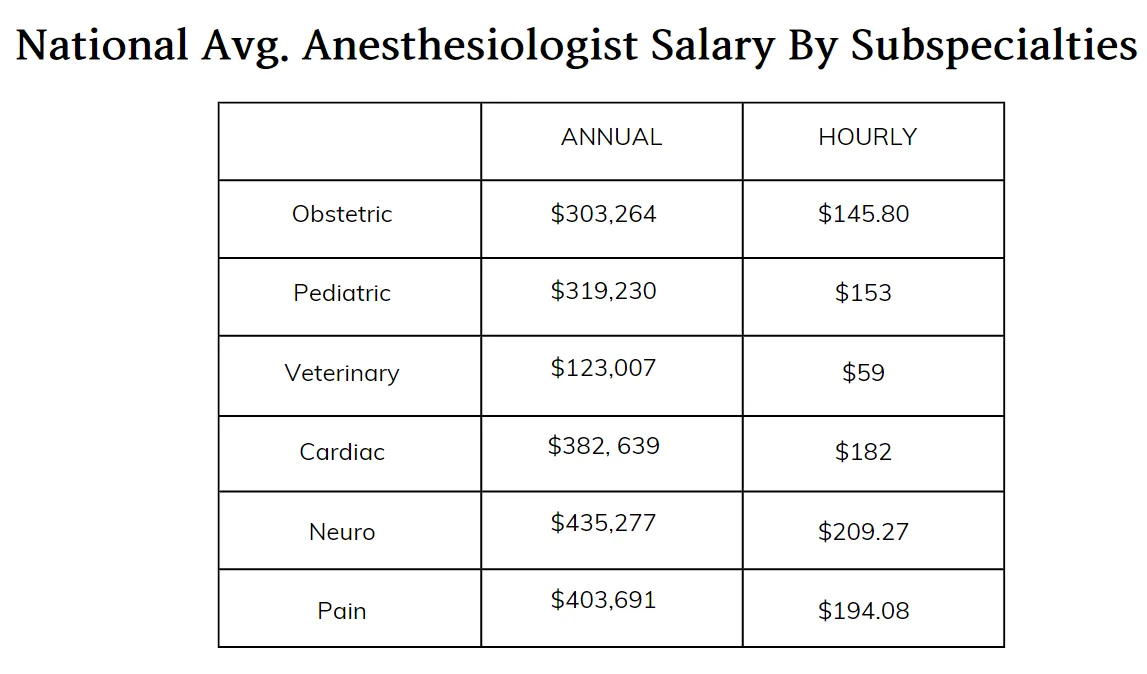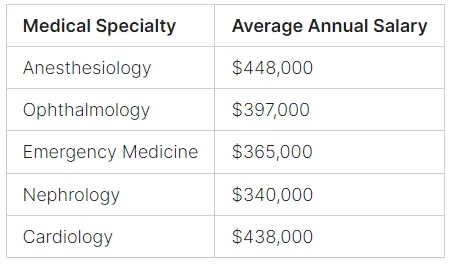Future Projections for Anesthesiologist Salary: Predicting Compensation Trends in the Field

Are you curious about the salary prospects for anesthesiologists? In this article, we will explore the current and future projections for anesthesiologist salaries, providing valuable insights into the compensation trends in this field.
Anesthesiologists have experienced a rise in income over the past few years. According to the Medscape Anesthesiologist Compensation Report, the average annual salary for anesthesiologists is around $448,000, placing them in the top one-third of all medical specialties in salary. From 2020 to 2024, anesthesiologists saw their income rise by 10%, with an average salary increase of $70,000. Despite the impact of the COVID-19 pandemic, with some anesthesiologists experiencing a decline in income due to job loss or reduced hours, the majority still feel fairly compensated, with 58% expressing satisfaction with their earnings.
Key Takeaways:
- Anesthesiologists have seen a rise in income in recent years.
- The average annual salary for anesthesiologists is around $448,000.
- From 2020 to 2024, anesthesiologists experienced a 10% increase in income.
- Despite the challenges of the COVID-19 pandemic, the majority of anesthesiologists feel fairly compensated.
- 58% of anesthesiologists express satisfaction with their earnings.
Anesthesiologist Salary Trends in Comparison to Other Medical Specialties

When it comes to salary, anesthesiologists have consistently fared well in comparison to their peers in other medical specialties. According to the latest data from Medscape's Anesthesiologist Compensation Report, anesthesiologists experienced a notable increase in their income in 2022. This salary growth outpaced several other medical specialties, including ophthalmology, emergency medicine, and nephrology, which saw a decrease in compensation during the same period.
The rise in anesthesiologist salaries can be attributed to various factors, such as the critical nature of their work and the demand for their specialized skills. Anesthesiologists play a vital role in ensuring patient safety and comfort during surgical procedures by administering anesthesia and closely monitoring patients throughout the surgery.
As the healthcare industry continues to evolve, anesthesiologists remain in high demand. The table below illustrates a comparison of anesthesiologist salaries with other medical specialties:

As demonstrated, anesthesiologists have a higher average salary compared to other medical specialties, reinforcing their position as one of the top-earning fields within medicine.
In addition to competitive compensation, anesthesiologists often express a high level of job satisfaction and feel fairly compensated for their expertise and responsibilities. This combination of financial stability and personal fulfillment makes anesthesiology an attractive career choice for many aspiring physicians.
Overall, the salary trends in anesthesiology, coupled with the rewarding nature of the profession, indicate a promising future for individuals pursuing a career as an anesthesiologist.
Related: Anesthesiologist Salary: Exploring Compensation in Different Work Settings
Factors Influencing Anesthesiologist Salary

Several factors can influence the salary of an anesthesiologist. Understanding these salary determinants is crucial for navigating the compensation landscape in this field.
Specialty Choice
Your choice of specialty as an anesthesiologist can have a significant impact on your salary. Specialized surgeons, cardiologists, and anesthesiologists typically earn higher salaries than general practitioners. The more specialized your skills and knowledge, the greater your earning potential.
Geographic Location
The location where you practice as an anesthesiologist also plays a role in determining your salary. Urban areas and regions with high demand for healthcare services generally offer higher salaries. The cost of living and market dynamics in different areas can greatly influence the compensation you receive.
Experience
Anesthesiologists with more experience generally have higher earning potential. As you accumulate years of practice and expertise, your value in the medical field increases, which can translate into higher salaries and better compensation packages.
Gender Pay Gap
Unfortunately, the gender pay gap persists in medicine, with male doctors historically earning higher salaries than their female counterparts. This disparity is an ongoing issue that the healthcare industry continues to address and work towards eliminating.
Type of Practice, Hours Worked, and Benefits
The type of practice you work in, the number of hours you dedicate to your profession, and the benefits you receive can all impact your salary as an anesthesiologist. Private practices, academic institutions, and healthcare organizations may have different compensation structures and benefits packages, which in turn can affect your overall income.
Understanding the factors that influence anesthesiologist salary can help you make informed decisions about your career and negotiate fair compensation. Keep in mind that each individual's salary may vary based on these factors, and it is important to carefully consider your personal circumstances.
Stay informed and proactive in managing your financial future as an anesthesiologist. In the next section, we will explore the job market and career outlook for anesthesiologists, shedding light on the demand for this specialized medical profession.
Related: Entry-Level Anesthesiologist Salary
Job Market and Career Outlook for Anesthesiologists

When it comes to the job market for anesthesiologists, the future looks promising. The demand for anesthesiologists is expected to grow significantly, creating numerous career opportunities in the field. According to Career Explorer, the anesthesiologist job market is projected to experience a substantial growth rate of 15.5% between 2016 and 2026, leading to a demand for approximately 6,200 anesthesiologists.
This high demand can be attributed to various factors, including advancements in medical technology, population growth, and an increasing focus on pain management. Additionally, with a large number of experienced anesthesiologists expected to retire in the coming years, the need for new professionals in the field will further contribute to job growth.
The job market for anesthesiologists is not only expanding but also facing a shortage. Anesthesiology News reported a shortage in the anesthesia job market, which highlights the urgent need for qualified anesthesiologists. As a result, aspiring anesthesiologists can expect a solid job market with ample career opportunities.
Having a positive career outlook means that anesthesiologists can enjoy stability and job security, knowing that their skills and expertise are in high demand. The increasing demand for anesthesiologists also translates into competitive salaries and potential for career advancement.
Projected Job Growth for Anesthesiologists

Shortage in the Anesthesia Job Market

With a favorable job market and promising career outlook, pursuing a career as an anesthesiologist can lead to a rewarding and fulfilling professional journey.
Related: Anesthesiologist Salary by Specialty
Tips for Increasing Anesthesiologist Income

As an anesthesiologist, you have various opportunities to increase your income and maximize your earning potential. By employing the following strategies, you can ensure fair compensation and potentially enhance your financial stability.
Negotiating Pay and Contract Review
When it comes to increasing your income as an anesthesiologist, negotiating your pay and thoroughly reviewing your contract are essential steps. By effectively negotiating with your employer or potential employers, you can secure a salary that aligns with your skills, experience, and the local market rates.
Additionally, contract review firms can provide valuable assistance in evaluating the terms of your employment agreement. These expert professionals can help identify any potential gaps or areas of improvement to ensure you receive adequate compensation for your services. By addressing these aspects early on, you can set yourself up for a more financially rewarding career.
Pursuing Additional Work and Moonlighting
If you're looking to increase your income further, consider taking on additional work opportunities. You can explore options within your current job, such as increasing your hours or taking on additional shifts. By dedicating more time to your profession, you can acquire a higher income level.
Alternatively, you can consider moonlighting at another medical organization. Many hospitals and clinics offer part-time or temporary positions that allow anesthesiologists to supplement their income. This can provide you with a chance to expand your skills, gain additional experience, and boost your earning potential.
Incentive Bonuses
Incentive bonuses can significantly contribute to increasing your income as an anesthesiologist. In the medical field, it is common for physicians to receive performance-based incentives. According to recent data, 57% of physicians, including anesthesiologists, receive incentive bonuses. In 2022, anesthesiologists received an average incentive bonus of $68,000.
These bonuses are typically tied to various performance metrics, such as patient satisfaction, productivity, and quality of care. By meeting or exceeding these benchmarks, you can earn additional income on top of your base salary.
Conclusion
As we conclude our analysis of anesthesiologist salary trends, it is evident that this field continues to offer a strong financial outlook. Over the past few years, anesthesiologists have experienced increasing income trends, with an average annual salary of around $448,000. This places them in the top one-third of all medical specialties in terms of compensation.
Several factors influence an anesthesiologist's salary, including specialty choice, location, and experience. Choosing a specialized field within anesthesiology, practicing in high-demand areas, and gaining more experience can contribute to higher earning potential. Furthermore, by actively negotiating pay and contract terms, anesthesiologists can ensure they receive fair compensation.
Despite the challenges posed by the COVID-19 pandemic, anesthesiologists generally feel fairly compensated and satisfied with their earnings. Looking ahead, the future projections for anesthesiologist salary foresee continued growth and opportunities for a rewarding career in the field. With an expected job market growth of 15.5% between 2016 and 2026, aspiring anesthesiologists can enter a profession with high demand and potential for financial success.
FAQ
What is the average annual salary for anesthesiologists?
The average annual salary for anesthesiologists is around $448,000.
How does an anesthesiologist's salary compare to other medical specialties?
Anesthesiologists have a favorable salary outlook compared to their peers, with one of the highest increases in income among all specialties.
What factors can influence an anesthesiologist's salary?
Specialty choice, geographic location, experience, and job benefits are some factors that can impact an anesthesiologist's salary.
What is the job market and career outlook for anesthesiologists?
The job market for anesthesiologists is projected to grow by 15.5% between 2016 and 2026, creating a demand for approximately 6,200 anesthesiologists.
How can anesthesiologists increase their income?
Anesthesiologists can increase their income by negotiating pay and contract terms, seeking contract review assistance, taking on additional work, and earning incentive bonuses.
What is the future outlook for anesthesiologist salary?
Anesthesiologists can expect continued growth and opportunities for a rewarding career in terms of salary.
If you need a top anesthesia clinical or are you an anesthesiologist looking for your next great career opportunity, reach out to us today!
Book a consultation call by using the calendar link here.

